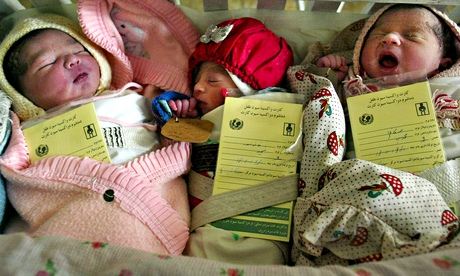
The International Baby Food Action Network (Ibfan) launched a global report in December 2013 calling for an investment of more than $17bn (£10.7bn) annually to preserve and raise the bar on breastfeeding practice.
The hope is that this will help lower the potential health problems faced by babies who are not breastfed - including obesity and diabetes and inhibited cognitive performance, and to shed light on potential health risks faced by women who do not breastfeed such as breast and ovarian cancers.
Despite all the evidence for the benefits of breastfeeding, of the 135 million babies born each year, 83 million are not breastfed as much as the World Health Organisation recommends. Global rates of optimal infant and young child feeding practices continue to stagnate and have not shown improvement over the past two decades.
There are many potential reasons for this. Beyond a broad lack of awareness of the benefits of breastfeeding, breastfeeding can be difficult if the culture of the mothers' community is opposed to it. If bottle-feeding is a societal norm and it is considered equal to breastfeeding, it may become difficult for the mother to stick to breastfeeding and have confidence in her milk supply. Mothers may need encouragement and personal support to start and continue breastfeeding, and this is something that wider society can support them to do.
But the underlying fact is that when it comes to infants, there has been no sustained outcry at the millions who die due to inappropriate feeding. If the issue is so relevant to public health, why is it missing from the policy agenda? Is it that the comforting messages of the baby food industry have deafened us to hearing the facts, and softened the urge to act?
To rise to the commitments called for within the Ibfan report, governments and international agencies could take the following actions:
Recommendations for governments and policymakers
• Plan and budget to implement the WHO's global strategy for infant and young child feeding.
• Find gaps in existing breastfeeding policies and programmes using WHO's assessment tools.
• Based on the policy gaps found, develop national and sub-national action plans for one to five years with clear budgets to bridge them.
• Develop national, regional and/or provincial monitoring and periodic reporting systems on optimal breastfeeding practices.
• Promote the benefits of breastfeeding to citizens, in terms of disease reduction and long-term health, as well as cost savings.
Recommendations for international organisations
• Allocate specific budgets for increasing optimal breastfeeding within existing global funds for child survival, nutrition and health.
• The current estimates on scaling up nutrition intervention given by the World Bank do not fully reflect the funds needed to protect, promote and support breastfeeding. They should therefore be revisited, taking into account the broad interventions needed for universal services for optimal breastfeeding.
• Many agencies talk a lot about breastfeeding, but they cannot be taken seriously without clearly stating how they address it. All international organisations should report annually the money spent on programmes or improving policy for optimal breastfeeding.
Appropriate nutrition in the first 1,000 days is vital for a child's development. As the global health burden from child malnutrition shows no signs of waning, neither should our commitment to action.
Dr Kailash Chand OBE is deputy chair British Medical Association Council. Follow @KailashChandOBE on Twitter
This content is brought to you by Guardian Professional. To get more articles like this direct to your inbox, sign up free to become a member of the Global Development Professionals Network

